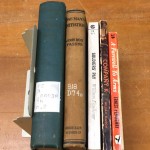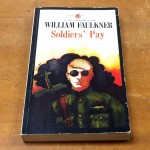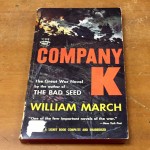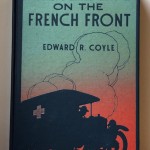 This Veterans Day, we look at a largely forgotten American war: World War I. It’s easy to overlook because our official participation was short and our losses paled in comparison to that of France, Germany, and Britain. However, thousands of Americans were involved in the war effort, both before and after our declaration, and some 116,000 lost their lives, many in the crucial final stages of the war.
This Veterans Day, we look at a largely forgotten American war: World War I. It’s easy to overlook because our official participation was short and our losses paled in comparison to that of France, Germany, and Britain. However, thousands of Americans were involved in the war effort, both before and after our declaration, and some 116,000 lost their lives, many in the crucial final stages of the war.
Much of the way WWI has come into our cultural consciousness is through novels. Here are just a few of them we hold in our collections at Hoole Library, paired with similar archival resources.
Dos Passos, John. One Man’s Initiation — 1917. London, G. Allen & Unwin, 1920.
Dos Passos went to war before America did, serving with the American Volunteer Motor Ambulance Corps in France and Italy, later in the U.S. Army Medical Corps. This novel was his first, after which he published the more famous Three Soldiers (1921), depicting the different war experiences of three very different men.
- Hoole Library holds materials related to another American ambulance driver, Valentine J. Oldshue (MSS.1072): This collection contains newspaper articles about covering the peace negotiations in Paris after World War One, Memorial Day ceremonies at American cemeteries in the 1920s, letters, photographs, postcards from France and Albania, press credentials, and Oldshue’s dog tags. This collection is also online.
Boyd, Thomas. Through the Wheat. New York, Scribner’s, 1923.
Boyd was a journalist from Ohio. This novel draws on his own experiences serving in the Marine Corps in France.
- Hoole Library holds papers relating to another soldier serving in France, George Waring Huston (MSS.0724): This collection contains correspondence, photographs, and other materials created by the Huston family in Selma, Dallas County, Alabama. Most materials center around George Waring Huston, who was killed in World War I. A large number of letters are from George Huston to his parents Nelle Smith Huston and R. Walter Huston while at Camp Gordon, Georgia. This collection is also online.
Faulkner, William. Soldiers’ Pay. New York: New American Library, 1968 [1926].
 Faulkner started his literary career with this novel about a returning veteran of the war. Though he trained as pilot with the Royal Canadian Air Force (having been too short to join the U.S. Army), he never saw combat. Perhaps that’s why he felt the need to write a novel speaking for those who had.
Faulkner started his literary career with this novel about a returning veteran of the war. Though he trained as pilot with the Royal Canadian Air Force (having been too short to join the U.S. Army), he never saw combat. Perhaps that’s why he felt the need to write a novel speaking for those who had.
- Hoole Library holds the papers of another man frustrated by his inability to make it to the front, Paoli Ashe Smith (MSS.1294): This collection consists mainly of personal correspondence from Smith to his mother during World War I, letters received from several of his cousins, financial and legal papers, and photographs. This collection is also online.
Hemingway, Ernest. A Farewell to Arms. New York: Bantam, 1949 [1929].
Hemingway, like Dos Passos, was also an ambulance driver, working with the Red Cross in Italy. That experience, including his wounding during a mortar attack, served as the backbone of this novel, which itself would be transformed into the 1996 film In Love and War.
- Hoole Library holds materials relating to the service of another Red Cross worker in Italy, Victor Hugo Friedman (MSS.0545): The collection contains Friedman’s personal and official correspondence, photographs of a camp in the Alps, his lieutenant’s commission, his Croce al Merito di Guerra and other military pins and ribbons, and various items issued to him by the military. Incoming correspondence is arranged alphabetically by author’s surname, and outgoing correspondence is arranged chronologically. This collection is also online.
March, William. Company K. New York: New American Library, 1958 [1933].
 March, born William Campbell, was a native of Mobile, Alabama. He served with honors in the Marine Corps, largely in France. Though he wrote many novels and short stories, among them The Bad Seed, this was his first and most enduring. It depicts the war from dozens of perspectives, from the patriotic to the pathetic.
March, born William Campbell, was a native of Mobile, Alabama. He served with honors in the Marine Corps, largely in France. Though he wrote many novels and short stories, among them The Bad Seed, this was his first and most enduring. It depicts the war from dozens of perspectives, from the patriotic to the pathetic.
- Hoole Library holds some of March’s personal papers (MSS.0266): This collection consists of approximately 1100 items dating from from 1897 to 1980, including correspondence, literary productions (publications, manuscripts, notes, research), clippings (primarily reviews), criticism, photographs, memorabilia, and a bust of March.

